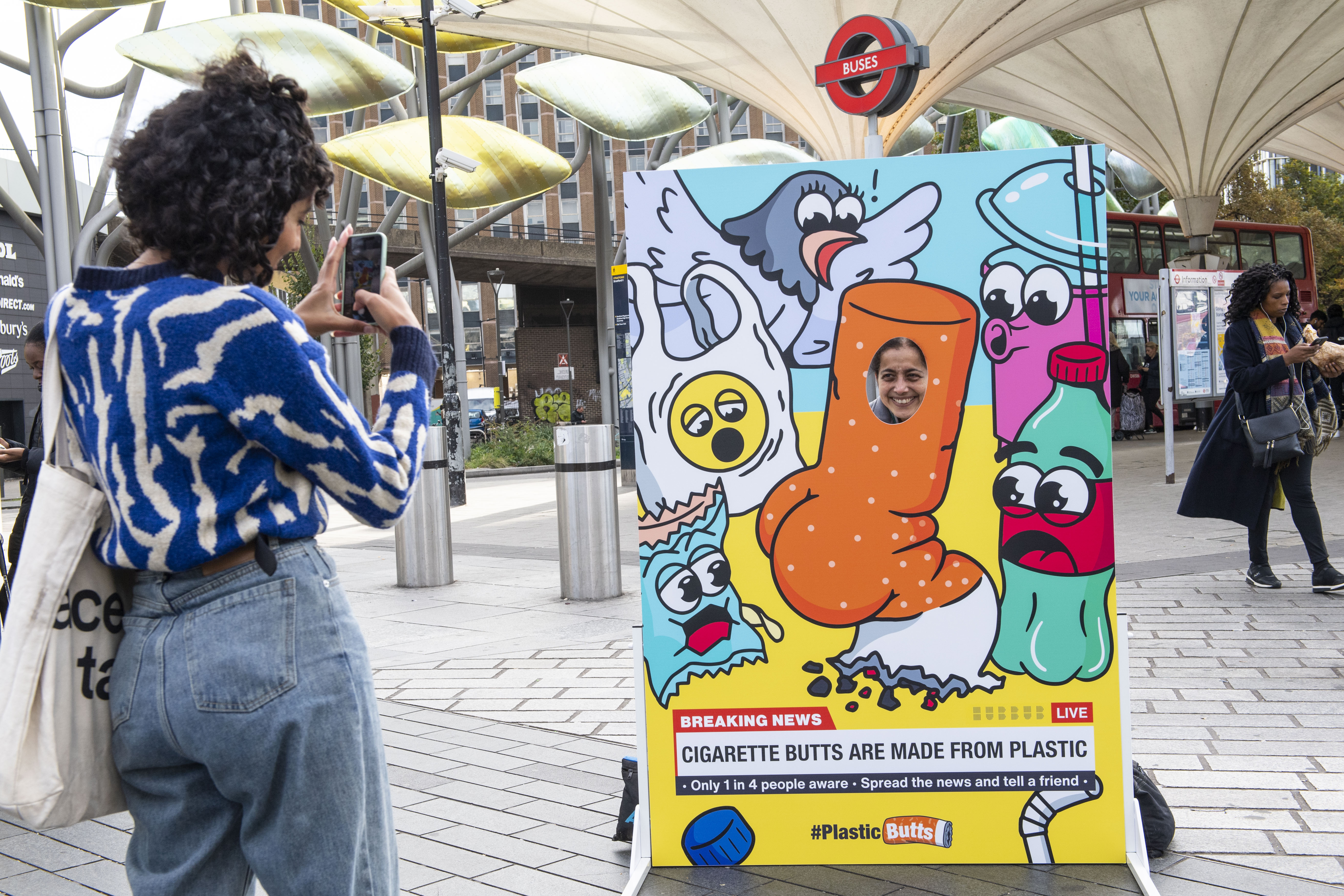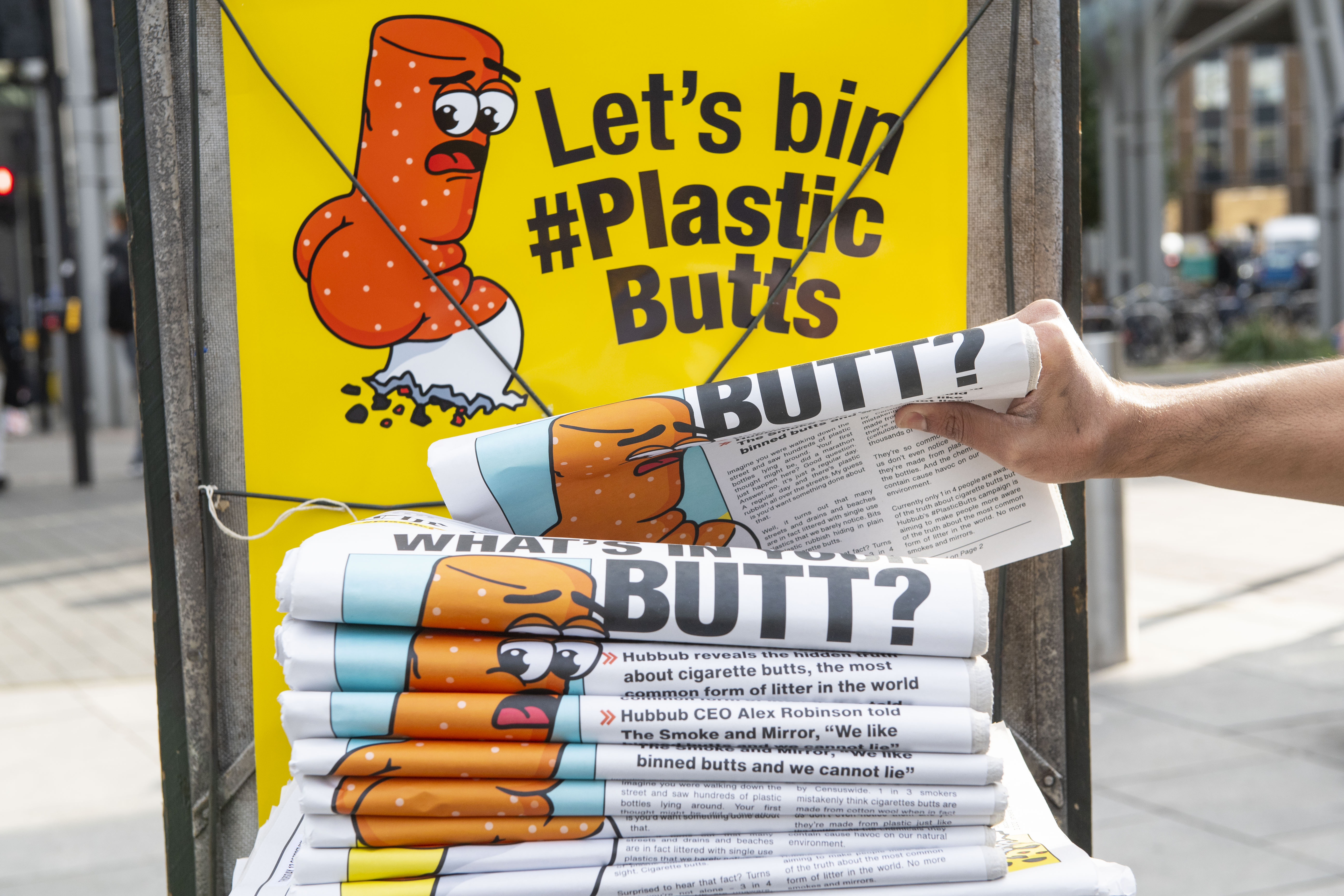
Smokers blind to devastating impact of butts on the environment.
- More than 1 in 3 smokers think cigarette filters are made from cotton wool
- Only 1 in 4 are aware they are actually plastic
- Pilot campaign launches to make cigarette litter “seen”
New research from environmental charity Hubbub reveals just over 1 in 4 smokers (28%) are aware that cigarette butts are made from plastic.
Of the 1,500 smokers surveyed by Censuswide, over a third (36%) mistakenly think cigarette butts contain cotton wool when in fact the white fluffy material is made from a type of plastic (cellulose acetate) which once smoked, can release thousands of chemicals.
Cigarette butts are the most littered item in the world and cause serious damage to the environment by leaching out toxic chemicals over a number of years but they don’t get the same attention as other plastic litter which is arguably less harmful.
The survey showed over a third of smokers (34%) believe it takes less than a year for a cigarette butt to decompose but the truth is it doesn’t ever decompose and can take up to 10 years to start breaking down into microplastics. More than a quarter (28%) admit to dropping their cigarette butts down the drain – a direct route to our water ways and oceans.
Hubbub today took over the streets surrounding Stratford Station, the busiest train station in the UK, by installing eye-catching interventions to raise awareness of their plastic content and help cigarette litter be “seen”. This included giant billboards, ballot bins, newspaper stands and “talking butts” to catch the attention of passers-by.
In addition, Hubbub is today calling on councils and industry to do more to raise awareness about what cigarette butts and filters are made from and help encourage smokers to dispose of their butts responsibly. 55% of smokers surveyed say there are not enough cigarette bins at bus stops, 51% said the same for taxi ranks and 51% said the same for outside supermarkets.
The location of bins is key. Scientists from Ellipsis Earth who track cigarette litter using cutting-edge mapping software reveal that ashtrays placed in data-highlighted hotspots such as park benches, bus stops and road junctions can reduce littering of cigarettes by up to 90%. In an average town, that's approximately 40,000 cigarettes a week being captured and correctly disposed of instead of washing into waterways and harming the environment. What's more, the team's research shows that butt-free streets reduce the littering of other items too, by up to 75%, so tackling cigarette butts is a win-win for councils, wildlife and the public.
Dr Dannielle Green, Associate Professor at Anglia Ruskin University who led the first study to show the damage that cigarette butts can cause to plants in 2019 said: Cigarette butts are single-use plastics and are hazardous waste. They release microplastics and leach out toxic chemicals that can be lethal to marine and freshwater plants and animals. Even if they don’t cause death, cigarette butts can reduce the ability of certain aquatic organisms to reproduce or feed. On land they can contaminate crops with nicotine and reduce the growth of important plants such as grass and clover. Despite being the most common litter item for decades, cigarette butts have flown under the radar in the fight against plastic pollution and it is time to change this.”
Heather Poore, co-founder of Hubbub said: “We were encouraged to see that 57% of smokers when told cigarettes contained plastic said they’d be more likely to look for an ashtray nearby and 50% say they are more likely to keep hold of their cigarette butts for longer. This suggests many smokers do want to do the right thing but we need more bins in the right places and a much higher level of awareness about them containing plastic – something which cigarette manufacturers, councils and landowners can help with.
Cigarette litter has become invisible and we need it to be seen. We’re looking forward to seeing how our interventions in Stratford are received and call on society in general to help make throwing a cigarette on the ground become socially unacceptable.”
Cllr James Asser, Cabinet Member for Environment and Sustainable Transport at the London Borough of Newham said: “I’m pleased to see Hubbub here today in Stratford highlighting that cigarette butts are a major cause of litter and have a devastating impact on our environment. Discarding cigarette butts on the streets in Newham is not acceptable. Our new litter enforcement officers are tackling this and dropping litter including cigarette ends will result in a £150 fixed penalty notice.
“We want to see fewer people smoking which would be better for both their health and the environment, which is why Newham works with the NHS and health agencies to encourage people to give up. If people do smoke we urge them to dispose of their cigarettes properly which is better for the environment.”
Cleaning up littered cigarette butts currently costs UK local authorities around £40 million per year2. Despite the fact that throwing a cigarette on the ground is against the law, the survey suggested that 1 in 3 smokers (32%) don’t realise it’s illegal to litter cigarettes.
More facts about cigarette butts
- Smokers around the world buy roughly 6.5 trillion cigarettes each year. That’s 18 billion every day. Only an estimated third of which make it into the bin.
- As well as plastic, toxic compounds in cigarette butts can include formaldehyde, nicotine, arsenic, lead, copper, chromium, cadmium, and a variety of polyaromatic hydrocarbons (PAHs).
- Tobacco companies may have to pay for the litter created by cigarettes under plans being explored by ministers to protect the environment and save local councils money. Regulatory extended producer responsibility scheme for cigarette butts in England, a new power currently being legislated for in the Environment Bill, would require the tobacco industry to pay the full disposal costs of tobacco waste products. Cigarette and tobacco product packaging is already covered by the proposed packaging producer responsibility scheme, which is currently undergoing a second phase of consultation.

